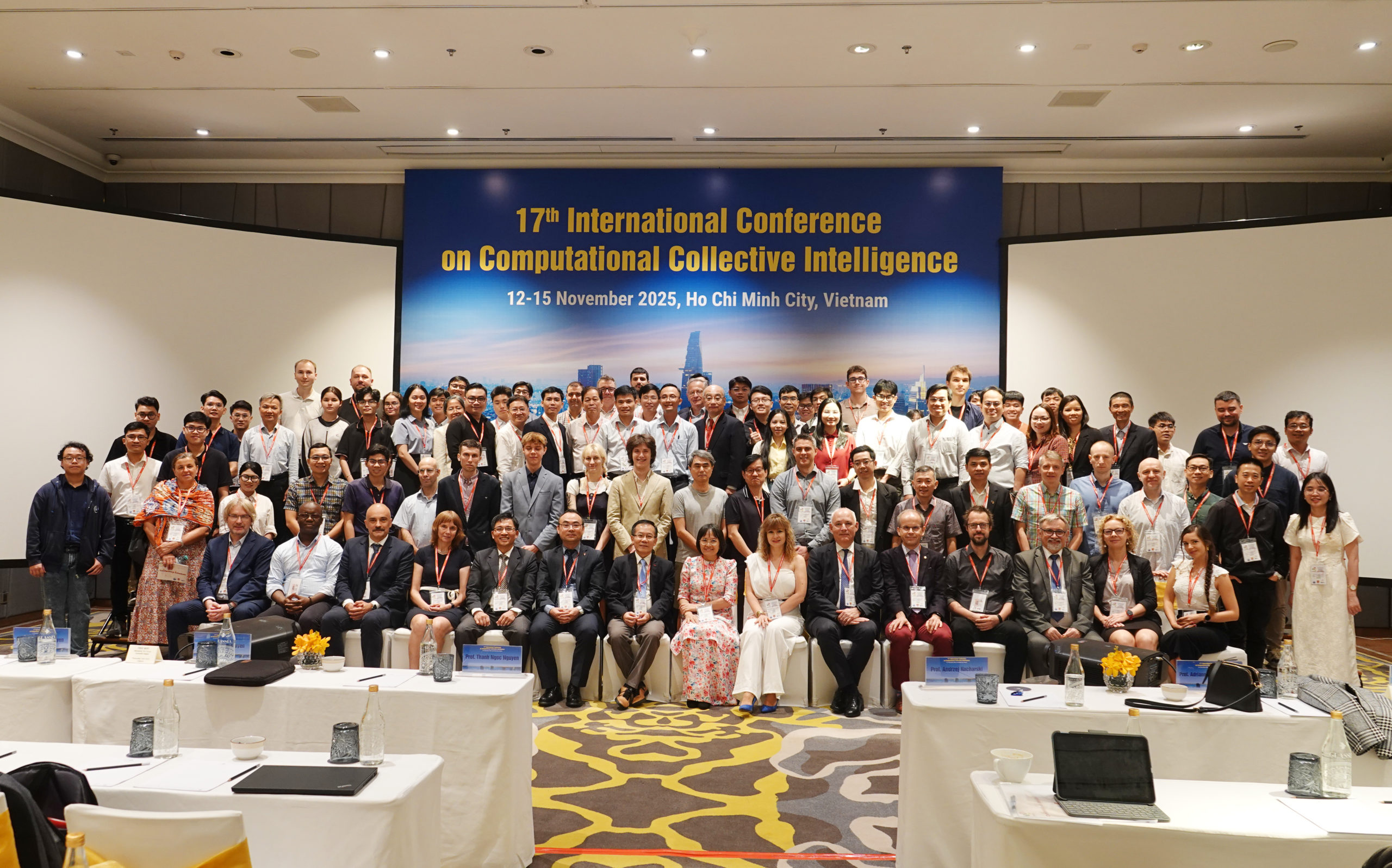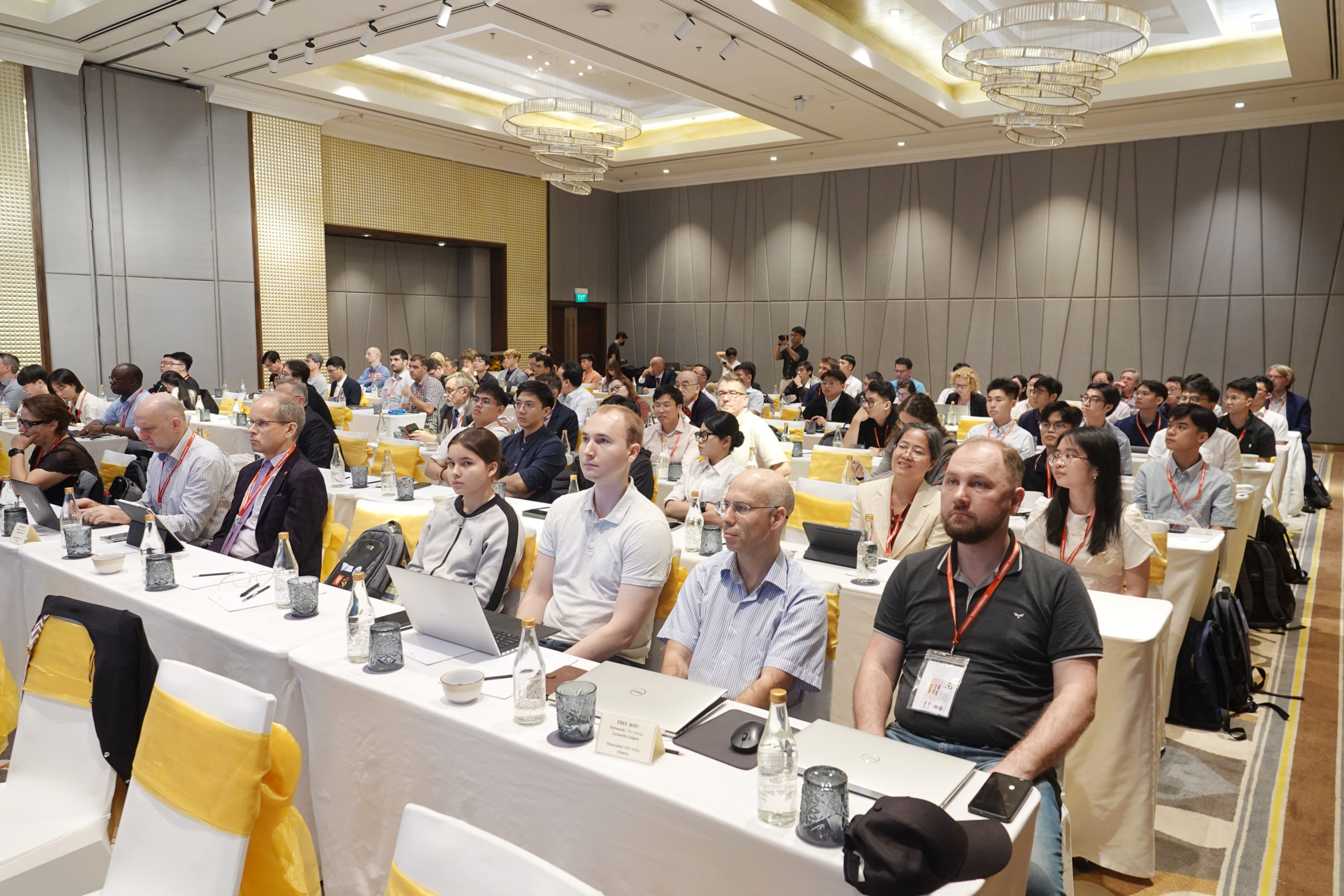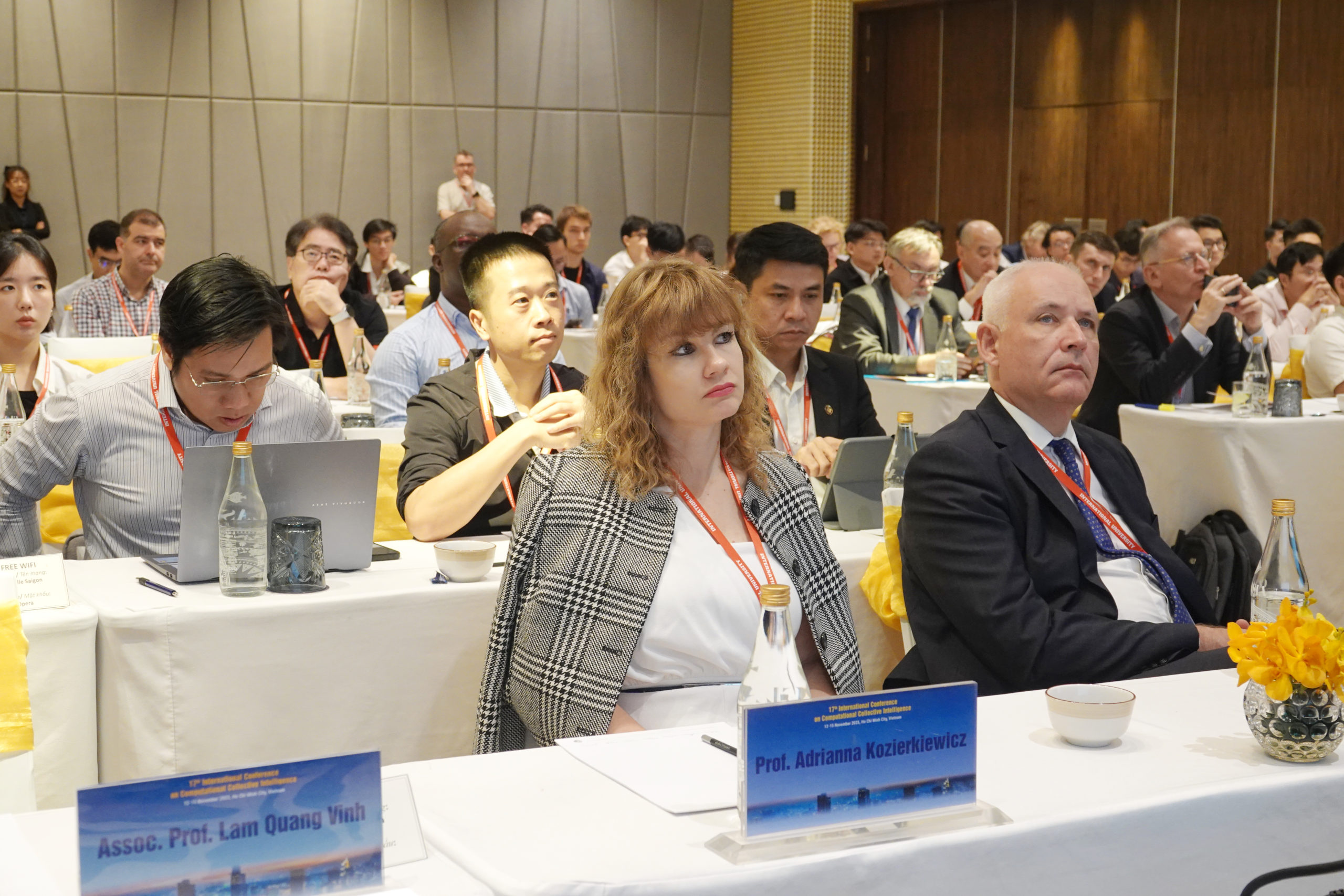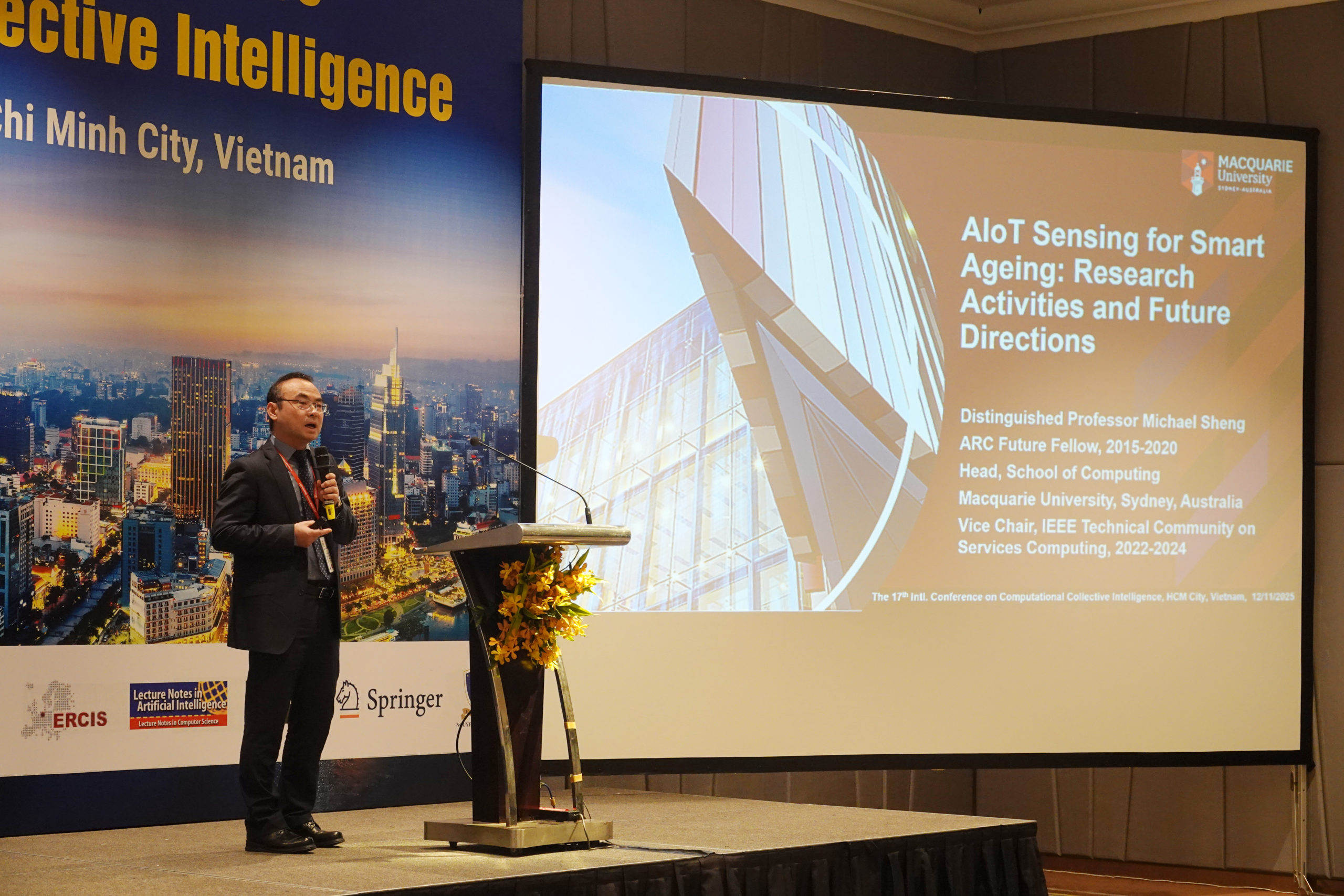
INTERNATIONAL UNIVERSITY HOSTS THE 17TH INTERNATIONAL CONFERENCE ON COMPUTATIONAL COLLECTIVE INTELLIGENCE (ICCCI 2025)




On the morning of November 12, 2025, International University – Vietnam National University Ho Chi Minh City (IU–VNU HCM), in collaboration with Wrocław University of Science and Technology (WUST), Poland, held the Opening Ceremony of the 17th International Conference on Computational Collective Intelligence (ICCCI 2025). This year’s conference welcomed nearly 150 authors, speakers, and invited guests participating directly in the opening session, marking a vibrant and dynamic start to the three-day scientific program.
The ICCCI conference has been held annually for 17 consecutive years and is ranked B under Australia’s CORE Conference Ranking. In 2025, the conference selected 115 papers out of 295 submissions from 36 countries, following a rigorous peer-review process to ensure the quality expected of a Rank B conference. Notably, 57 of the accepted papers feature Vietnamese researchers, reflecting the growing and increasingly significant contributions of Vietnam’s scientific community.

The conference welcomed nearly 150 authors, speakers, and guests in person.
Assoc. Prof. Dr. Dinh Duc Anh Vu – Vice President of International University, VNU-HCM – stated: “ICCCI 2025 focuses on sharing the latest research in Computational Collective Intelligence. The conference takes place from November 12 to 15, 2025, in Ho Chi Minh City. Computational Collective Intelligence is an interdisciplinary field that integrates Artificial Intelligence (AI), multi-agent systems, data science, social networks, cognitive science, and collective behavior. Its objective is to simulate, enhance, or leverage collective intelligence through computational methods to assist humans and automated systems in making decisions, learning, and innovating more effectively. Therefore, ICCCI 2025 aims to establish a reputable international academic forum dedicated to research on computationally driven collective intelligence methods and their applications.”

This year’s ICCCI conference takes place over three days (November 12–15) in Ho Chi Minh City.
The scope of ICCCI 2025 covers topics related to data and knowledge processing from multiple autonomous information sources, with a particular focus on collective intelligence, knowledge integration, data integration, group decision-making, multi-criteria decision-making, consensus computing, and social networks. These are all research directions receiving significant attention in the current context of rapidly developing Generative Artificial Intelligence (Generative AI) based on large language models.
The 17th ICCCI Conference is jointly organized by Vietnam National University, Ho Chi Minh City (VNU-HCM) and International University – VNU-HCM, in collaboration with Wrocław University of Science and Technology (Poland), with support from the IEEE SMC Technical Committee on Computational Collective Intelligence and the European Research Center for Information Systems (ERCIS). The ICCCI 2025 proceedings will be published by Springer in the Lecture Notes in Computer Science / Lecture Notes in Artificial Intelligence (LNCS/LNAI) series and widely disseminated within the international academic community.

Prof. Michael Sheng – Head of the School of Computer Science, Macquarie University (Australia) – presented research from the past ten years on the application of AI and IoT in elderly healthcare, aiming to advance smart city development and improve quality of life.
|
Introduction of Keynote Speakers at ICCCI 2025 Workshop The ICCCI 2025 International Workshop on Computational Collective Intelligence brought together leading global experts in artificial intelligence, data science, natural language processing, and IoT technology. The four keynote speakers of the conference include: Prof. Jie Lu, AO Professor Jie Lu is recognized as one of the world’s foremost scientists in computational intelligence and fuzzy machine learning. She has authored over 500 scientific publications, 6 monographs, and successfully supervised more than 50 PhD students. She has been awarded the Order of Australia (AO) and numerous prestigious awards from IEEE and ARC. Presentation Topic: Fuzzy Machine Learning – introducing theoretical frameworks, modern algorithms, and applications of fuzzy machine learning, including fuzzy transfer learning and drift learning in complex and uncertain systems. Assoc. Prof. Nguyễn Thị Thúy Loan Assoc. Prof. Nguyễn Thị Thúy Loan specializes in data mining, graph neural networks (GNN), and computational collective intelligence. She earned her PhD from Wrocław University of Science and Technology (Poland), held an ERCIM postdoctoral fellowship at theUniversity of Warsaw, and conducted research exchanges at NTNU (Norway). Presentation Topic: Graph Neural Networks and Their Applications in Computational Collective Intelligence – analyzing the role of GNNs in recommendation systems, scientific citation modeling, traffic optimization, and bioinformatics, while exploring the potential integration of GNNs with attention mechanisms and fuzzy logic. Distinguished Professor Michael Sheng Professor Michael Sheng is a leading expert in IoT, service computing, and big data analytics. He is ranked among the Top 5 most influential researchers in these fields according to Microsoft Academic and ScholarGPS. Presentation Topic: AIoT Sensing for Smart Aging – presenting research from the past 10 years on the application of AI and IoT in elderly healthcare, aiming to develop smart cities and enhance quality of life. Assoc. Prof. Maciej Piasecki Professor Maciej Piasecki is an expert in natural language processing and digital humanities, co-founder of CLARIN-PL and the plWordNet project – a large Polish semantic dictionary linked to Princeton WordNet. Presentation Topic: LLMs as Research Tools in Social Sciences and Humanities – discussing the application of large language models in social sciences and humanities research, lessons from the CLARIN-PL infrastructure, and the prospects for developing automated research assistants based on LLMs and RAG. |
Sustainable Development Goals: SSDG4-Quality education, SDG8-Decent work and economic growth, SDG9-Industry, innovation and infrastructure, SDG17-Partnerships for the goals